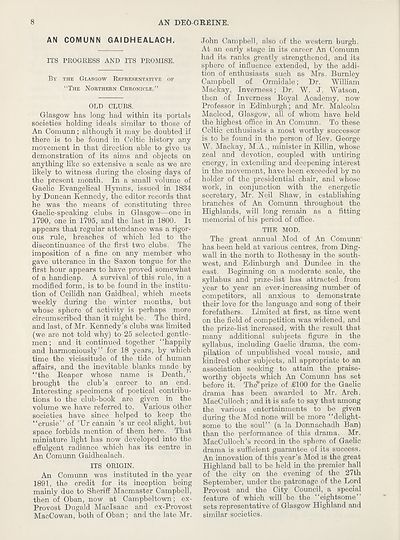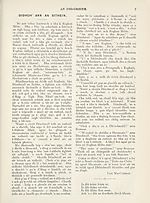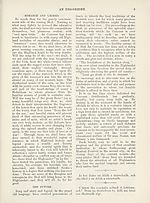An Comunn Gàidhealach Publications > Deo-gréine > Volume 17, October 1921 to September 1922
(16) Page 8
Download files
Complete book:
Individual page:
Thumbnail gallery: Grid view | List view

8
AN DEO-GREINE.
AN COMUNN GAIDHEALACH.
ITS PROGRESS AND ITS PROMISE.
By the Glasgow Representative of
“The Northern Chronicle. ’ ’
OLD CLUBS.
Glasgow has long had within its portals
societies holding ideals similar to those of
An Comunn; although it may be doubted if
there is to be found in Celtic history any
movement in that direction able to give us
demonstration of its aims and objects on
anything like so extensive a scale as we are
likely to witness during the closing days of
the present month. In a small volume of
Gaelic Evangelical Hymns, issued in 1884
by Duncan Kennedy, the editor records that
he was the means of constituting three
Gaelic-speaking clubs in Glasgow—one in
1790, one in 1795, and the last in 1800. It
appears that regular attendance was a rigor¬
ous rule, breaches of which led to the
discontinuance of the first two clubs. The
imposition of a fine on any member who
gave utterance in the Saxon tongue for the
first hour appears to have proved somewhat
of a handicap. A survival of this rule, in a
modified form, is to be found in the institu¬
tion of Ceilidh nan Gaidheal, which meets
weekly during the winter months, but
whose sphere of activity is perhaps more
circumscribed than it might be. The third,
and last, of Mr. Kennedy’s clubs was limited
(we are not told why) to 25 selected gentle¬
men; and it continued together “happily
and harmoniously’’ for 18 years, by which
time the vicissitude of the tide of human
affairs, and the inevitable blanks made by
“the Reaper whose name is Death,’’
brought the club’s career to an end.
Interesting specimens of poetical contribu¬
tions to the club-book are given in the
volume we have referred to. Various other
societies have since helped to keep the
“crusie’’ of ’Ur canain ’s ur ceol alight, but
space forbids mention of them here. That
miniature light has now developed into the
effulgent radiance which has its centre in
An Comunn Gaidhealach.
ITS ORIGIN.
An Comunn was instituted in the year
1891, the credit for its inception being
mainly due to Sheriff Macmaster Campbell,
then of Oban, now at Campbeltown; ex-
Provost Dugald Maclsaac and ex-Provost
MacCowan, both of Oban; and the late Mr.
John Campbell, also of the western burgh.
At an early stage in its career An Comunn
had its ranks greatly strengthened, and its
sphere of influence extended, by the addi¬
tion of enthusiasts such as Mrs. Burnley
Campbell of Ormidale; Dr. William
Mackay, Inverness; Dr. W. J. Watson,
then of Inverness Royal Academy, now
Professor in Edinburgh; and Mr. Malcolm
Maeleod, Glasgow, all of whom have held
the highest office in An Comunn. To these
Celtic enthusiasts a most worthy successor
is to be found in the person of Rev. George
W. Mackay, M.A., minister in Killin, whose
zeal and devotion, coupled with untiring
energy, in extending and deepening interest
in the movement, have been exceeded by no
holder of the presidential chair, and whose
work, in conjunction with the energetic
secretary, Mr. Neil Shaw, in establishing
branches of An Comunn throughout the
Highlands, will long remain as a fitting
memorial of his period of office.
THE MOD.
The great annual Mod of An Comunn
has been held at various centres, from Ding¬
wall in the north to Rothesay in the south¬
west, and Edinburgh and Dundee in the
east. Beginning on a moderate scale, the
syllabus and prize-list has attracted from
year to year an ever-increasing number of
competitors, all anxious to demonstrate
their love for the language and song of their
forefathers. Limited at first, as time went
on the field of competition was widened, and
the prize-list increased, with the result that
many additional subjects figure in the
syllabus, including Gaelic drama, the com¬
pilation of unpublished vocal music, and
kindred other subjects, all appropriate to an
association seeking to attain the praise¬
worthy objects which An Comunn has set
before it. The*prize of £100 for the Gaelic
drama has been awarded to Mr. Arch.
MacCulloch; and it is safe to say that among
the various entertainments to be given
during the Mod none will be more “delight¬
some to the soul” (a la Donnachadh Ban)
than the performance of this drama. Mr.
MacCulloch’s record in the sphere of Gaelic
drama is sufficient guarantee of its success.
An innovation of this year’s Mod is the great
Highland ball to be held in the premier hall
of the city on the evening of the 27th
September, under the patronage of the Lord
Provost and the City Council, a special
feature of which will be the “eightsome”
sets representative of Glasgow Highland and
similar societies.
AN DEO-GREINE.
AN COMUNN GAIDHEALACH.
ITS PROGRESS AND ITS PROMISE.
By the Glasgow Representative of
“The Northern Chronicle. ’ ’
OLD CLUBS.
Glasgow has long had within its portals
societies holding ideals similar to those of
An Comunn; although it may be doubted if
there is to be found in Celtic history any
movement in that direction able to give us
demonstration of its aims and objects on
anything like so extensive a scale as we are
likely to witness during the closing days of
the present month. In a small volume of
Gaelic Evangelical Hymns, issued in 1884
by Duncan Kennedy, the editor records that
he was the means of constituting three
Gaelic-speaking clubs in Glasgow—one in
1790, one in 1795, and the last in 1800. It
appears that regular attendance was a rigor¬
ous rule, breaches of which led to the
discontinuance of the first two clubs. The
imposition of a fine on any member who
gave utterance in the Saxon tongue for the
first hour appears to have proved somewhat
of a handicap. A survival of this rule, in a
modified form, is to be found in the institu¬
tion of Ceilidh nan Gaidheal, which meets
weekly during the winter months, but
whose sphere of activity is perhaps more
circumscribed than it might be. The third,
and last, of Mr. Kennedy’s clubs was limited
(we are not told why) to 25 selected gentle¬
men; and it continued together “happily
and harmoniously’’ for 18 years, by which
time the vicissitude of the tide of human
affairs, and the inevitable blanks made by
“the Reaper whose name is Death,’’
brought the club’s career to an end.
Interesting specimens of poetical contribu¬
tions to the club-book are given in the
volume we have referred to. Various other
societies have since helped to keep the
“crusie’’ of ’Ur canain ’s ur ceol alight, but
space forbids mention of them here. That
miniature light has now developed into the
effulgent radiance which has its centre in
An Comunn Gaidhealach.
ITS ORIGIN.
An Comunn was instituted in the year
1891, the credit for its inception being
mainly due to Sheriff Macmaster Campbell,
then of Oban, now at Campbeltown; ex-
Provost Dugald Maclsaac and ex-Provost
MacCowan, both of Oban; and the late Mr.
John Campbell, also of the western burgh.
At an early stage in its career An Comunn
had its ranks greatly strengthened, and its
sphere of influence extended, by the addi¬
tion of enthusiasts such as Mrs. Burnley
Campbell of Ormidale; Dr. William
Mackay, Inverness; Dr. W. J. Watson,
then of Inverness Royal Academy, now
Professor in Edinburgh; and Mr. Malcolm
Maeleod, Glasgow, all of whom have held
the highest office in An Comunn. To these
Celtic enthusiasts a most worthy successor
is to be found in the person of Rev. George
W. Mackay, M.A., minister in Killin, whose
zeal and devotion, coupled with untiring
energy, in extending and deepening interest
in the movement, have been exceeded by no
holder of the presidential chair, and whose
work, in conjunction with the energetic
secretary, Mr. Neil Shaw, in establishing
branches of An Comunn throughout the
Highlands, will long remain as a fitting
memorial of his period of office.
THE MOD.
The great annual Mod of An Comunn
has been held at various centres, from Ding¬
wall in the north to Rothesay in the south¬
west, and Edinburgh and Dundee in the
east. Beginning on a moderate scale, the
syllabus and prize-list has attracted from
year to year an ever-increasing number of
competitors, all anxious to demonstrate
their love for the language and song of their
forefathers. Limited at first, as time went
on the field of competition was widened, and
the prize-list increased, with the result that
many additional subjects figure in the
syllabus, including Gaelic drama, the com¬
pilation of unpublished vocal music, and
kindred other subjects, all appropriate to an
association seeking to attain the praise¬
worthy objects which An Comunn has set
before it. The*prize of £100 for the Gaelic
drama has been awarded to Mr. Arch.
MacCulloch; and it is safe to say that among
the various entertainments to be given
during the Mod none will be more “delight¬
some to the soul” (a la Donnachadh Ban)
than the performance of this drama. Mr.
MacCulloch’s record in the sphere of Gaelic
drama is sufficient guarantee of its success.
An innovation of this year’s Mod is the great
Highland ball to be held in the premier hall
of the city on the evening of the 27th
September, under the patronage of the Lord
Provost and the City Council, a special
feature of which will be the “eightsome”
sets representative of Glasgow Highland and
similar societies.
Set display mode to:
![]() Universal Viewer |
Universal Viewer | ![]() Mirador |
Large image | Transcription
Mirador |
Large image | Transcription
| An Comunn Gàidhealach > An Comunn Gàidhealach Publications > Deo-gréine > Volume 17, October 1921 to September 1922 > (16) Page 8 |
|---|
| Permanent URL | https://digital.nls.uk/127170165 |
|---|
| Description | Leabhar 17, Treasamh Mios an Fhoghair 1921 gu Dara Mìos an Fhoghair 1922 |
|---|---|
| Attribution and copyright: |
|
| Description | This contains items published by An Comunn, which are not specifically Mòd-related. It includes journals, annual reports and corporate documents, policy statements, educational resources and published plays and literature. It is arranged alphabetically by title. |
|---|
| Description | A collection of over 400 items published by An Comunn Gàidhealach, the organisation which promotes Gaelic language and culture and organises the Royal National Mòd. Dating from 1891 up to the present day, the collection includes journals and newspapers, annual reports, educational materials, national Mòd programmes, published Mòd literature and music. |
|---|---|
| Additional NLS resources: |
|

